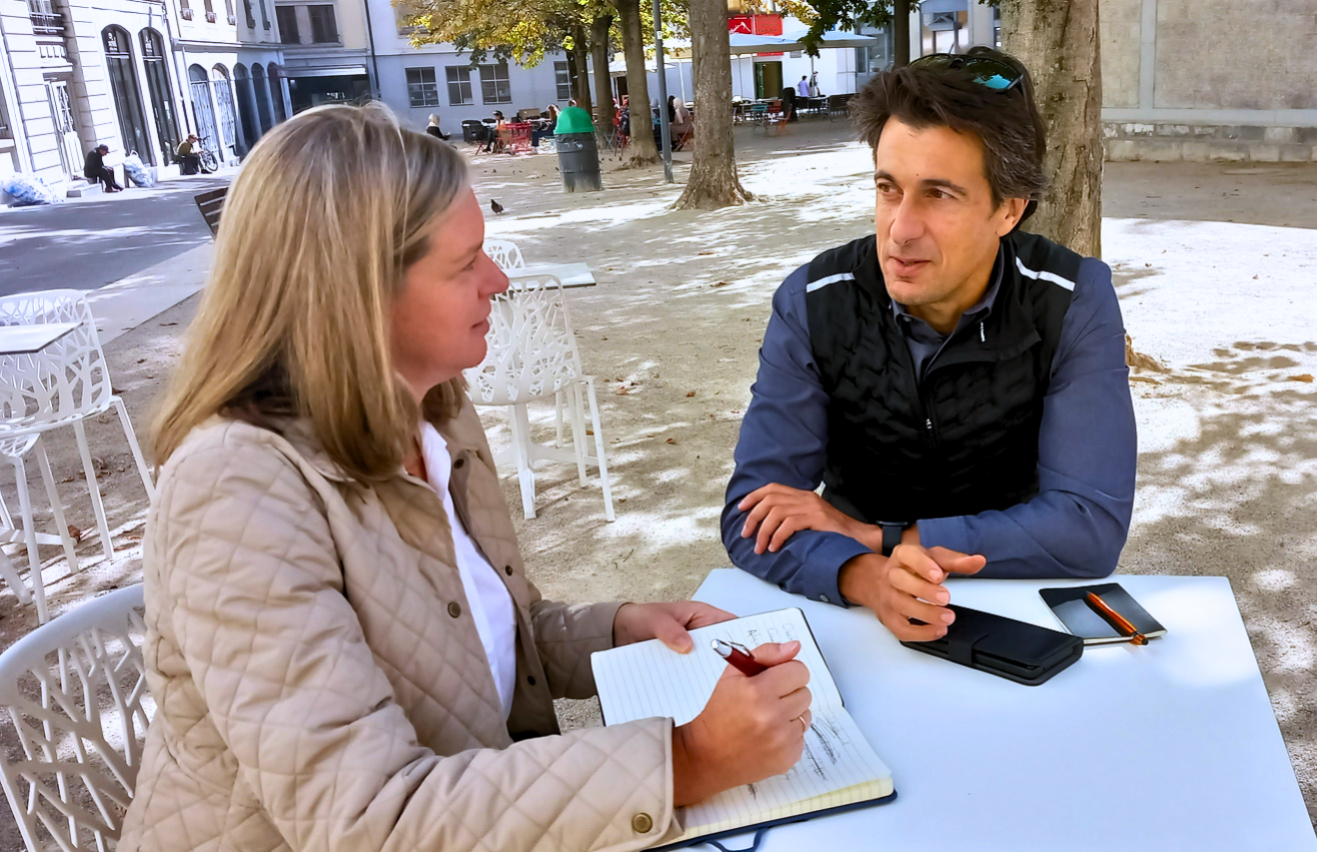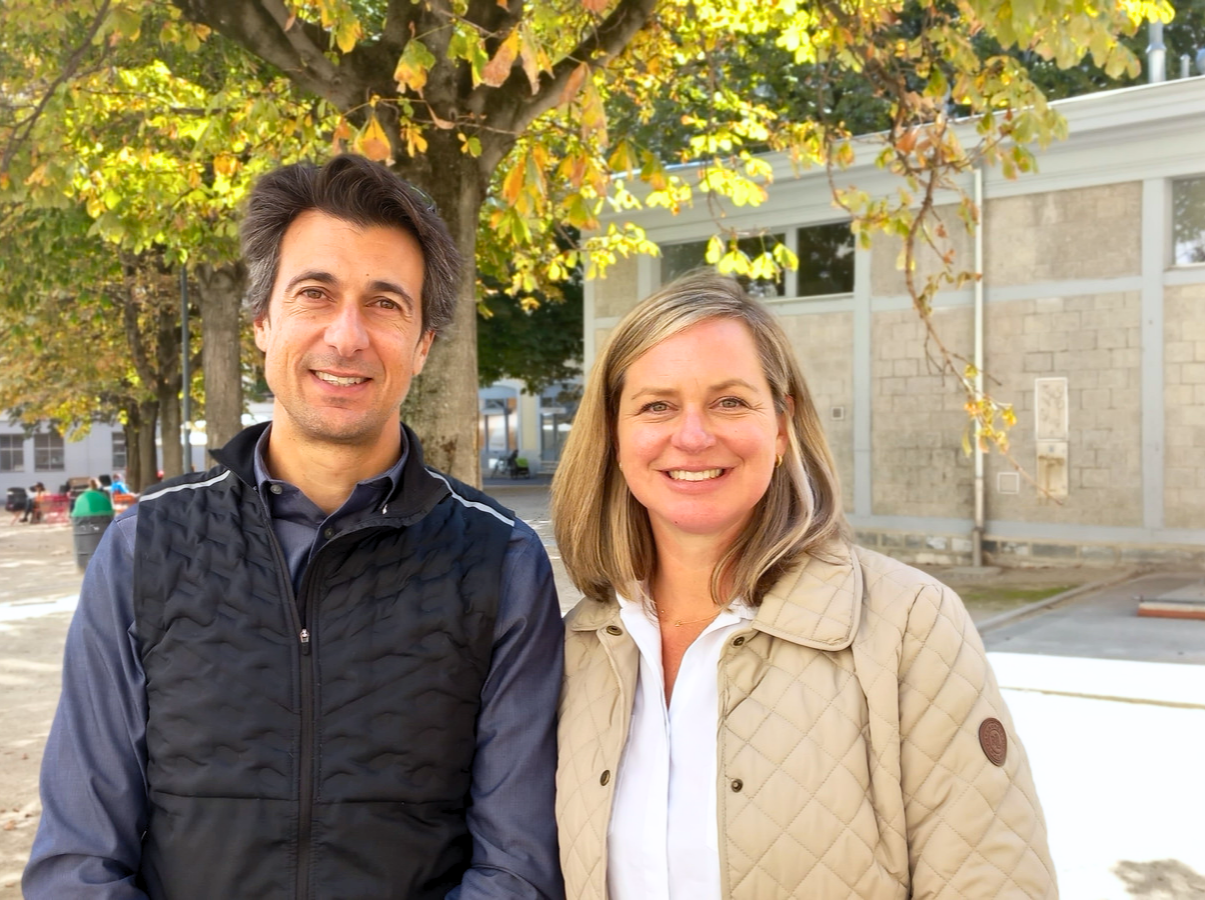Riccardo Lampariello, D-tree’s new Chief Executive Officer, had his first official day a couple of weeks ago. So far, he has been busy getting up to speed with all things D-tree, and our Chief Operational Officer, Alison Clark, sat down with him in Switzerland to learn more about his passions and visions.
Alison: How have your first weeks at D-tree been?
Riccardo: As intense and exciting as expected!
In the first three months, I will focus on getting to know the people and teams, D-tree’s culture and dynamics and meet with partners. I am visiting the countries where we have programs to better understand what the needs are and learn about the context. First out are Zambia and Malawi now at the end of September, Mainland Tanzania in the last week of October, Zanzibar in the first week of November, and then finally the US where I’ll get to see you again in person and meet the first two weeks of December.
Alison: What about D-tree excites you the most?
Riccardo: There are many exciting things about D-tree. One thing that stands out to me so far is the organizational culture, there is a strong sense of belonging and a commitment to genuinely “walk the talk”.
I’m also excited about the opportunity to contribute to real change as I strongly believe we have the capacity to contribute to significant improvements in health systems through the use of innovation. D-tree brought successfully to national scale a digital health initiative (Jamii ni Afya in Zanzibar) which is something still very rare in the field.
Alison: What does good leadership mean to you?
Riccardo: To me, good leadership is the ability to grasp the systemic complexity of today’s world and to shape a vision to address complex and intertwined issues. At the same time, it is also about engaging people around that vision, creating new opportunities and empowering the team to become leaders themselves to achieve that vision.
Good leadership is the ability to grasp the systemic complexity of today’s world and to shape a vision to address complex and intertwined issues. At the same time, it is also about engaging people around that vision, creating new opportunities and empowering the team to become leaders themselves to achieve that vision.

Alison: Tell me about a digital innovation for health that you think is inspiring.
Riccardo: I believe that the potential for artificial intelligence has not yet been realized. For example, the number one killer for children under the age of five is pneumonia. A well-trained pediatrician would diagnose it by checking their lung sound with a stethoscope but sadly, there are too few pediatricians and too many sick children. How about a low-cost sensor wired to a smartphone that can be placed over the child’s chest and in a few seconds capture the lung sound and transform it into a diagnosis through artificial intelligence? At the primary care level, it would then screen and trigger prompt accurate care for the children, and ultimately save many lives. It has the potential to be a game changer. I’m proud to have been contributing to such an initiative for the last 4 years, and the sensor is now going through the last tests.
Alison: What are some of the challenges you foresee for the global digital health field in the 5 years?
Riccardo: First of all, let’s remind ourselves that digital health is not a panacea for decades-old health system. These problems should be solved upstream, at the source. For instance, digital health cannot fix social injustice or rooted societal issues, but it can certainly mitigate the effects of that injustice.
A risk is that instead of serving those who currently have the most limited access to healthcare, technology will create an increasing inequity, the so-called digital divide. This must be prevented at all costs, starting with good governance of technology and a rights-based approach.
Having said that, digital health comes with risks. Access to digital technology will determine the health outcome. At D-tree, we are on a mission to ensure access to quality healthcare services for all, including digital-enabled services. A risk is that instead of serving those who currently have the most limited access to healthcare, technology will create an increasing inequity, the so-called digital divide. This must be prevented at all costs, starting with good governance of technology and a rights-based approach.

Alison: How do you see the role of Community Health Workers in sub-Saharan Africa over the next 5-10 years?
Riccardo: From my past experience, I have often wondered why we keep calling Community Health the last mile. For me they are the first mile: at the community level is where healthcare begins, starting from prevention and screening. Shall we coin a new hashtag #firstmilehealth and call for wider recognition of their critical role for the entire society?
It is essential that Community Health is well connected to the healthcare facilities and hospitals. In the next years, digital health will play a critical role to achieve that.
Alison: Share an achievement you contributed to that you are really proud of.
Riccardo: As mentioned earlier, scaling up a digital solution to the national level is extremely complex as it entails so many factors, so it still represents a work in progress. In my previous organization, Terre des hommes, we scaled up a digital job-aid tool in Burkina Faso to help health workers diagnose and treat sick children more accurately and what I am most proud of is being able to replicate it in other countries, and in particular, scaling it up in one state of India. Let’s be clear: by replication, I don’t mean to copy and paste an application — digital health is not just an app, which is a common mistake people do and probably the reason why most apps have still not scaled, if used at all. Digital health is about understanding the contexts, the available infrastructures, the users, the needs, the politics — in one word the entire ecosystem in-depth, and then to set up an ongoing quality improvement and creating the right incentives. That takes enormous time and resources, but it is the only way to make it work.
Today, every year, millions of children receive better quality care in Burkina Faso and India thanks to digital solutions, and countless lives are saved, and I’m really proud to have contributed to that.
Alison: You are Italian, what is your favorite Italian food?
Riccardo: For a vegetarian like me, Italy offers so many options. My favorite one is pizza Margherita, the simplest one, ideally with a top-up of roquette (rocket lettuce). Luckily, a couple of places in Geneva – where I live – can make a delicious one.
The D-tree team is thrilled to finally welcome our new CEO and is grateful to the leadership of Erica Layer over the past four years. Erica has now shifted into the role of Senior Advisor and is still around to support a smooth transition. You’ll hear more from her in the next month.
